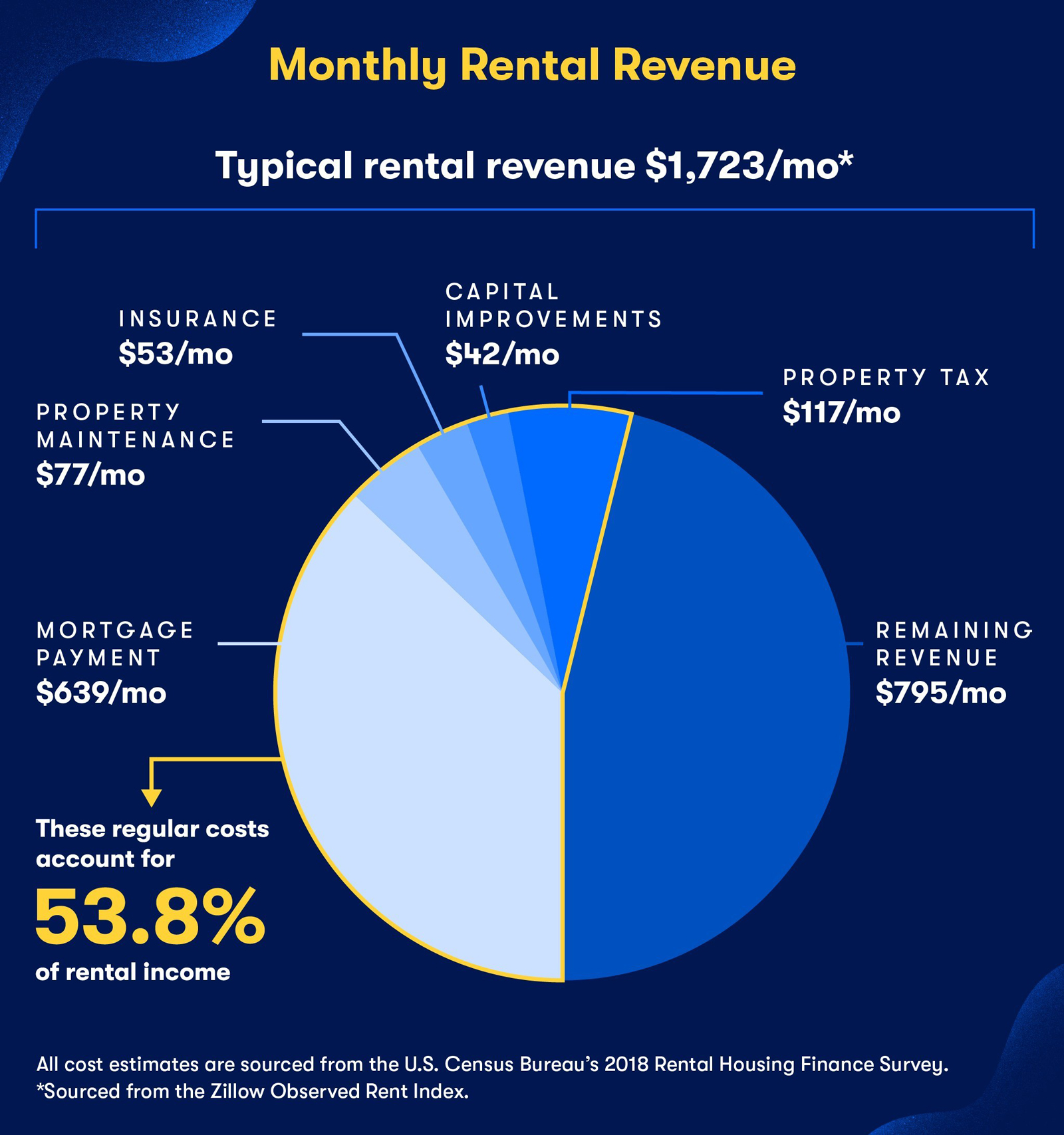The WPJ
THE WORLD PROPERTY JOURNALReal Estate Facts Not Fiction
Residential Real Estate News

Missed Residential Rents Balloon in U.S. as Government Aid Soon Expires
Residential News » Seattle Edition | By WPJ Staff | August 6, 2020 8:00 AM ET
Over half of rent payments on a typical unit go toward landlords' fixed costs
Zillow is reporting that as 32 million Americans received unemployment benefits in late June 2020, more renters were late on their July 2020 payments than any other time during the coronavirus pandemic. Boosted government unemployment aid has expired, meaning those numbers are likely to rise even further in coming months.
Those missed rent payments could cause a wave of housing insecurity and have the potential for deep impacts not only for renters, but also for rental owners who owe common costs of property ownership and other workers in the industry.
During the first week of July, 22.6% of U.S. apartment households did not pay any rent. That's up from 19.2% from the first week of June and higher than in any month since at least March. By July 13, the share of renters that hadn't yet paid fell to 12.4%, 2.5 percentage points higher than the same period last year. Two million people continue to apply for unemployment benefits weekly and recent estimates show half of all U.S. households have lost income during the pandemic making it likely that government aid has played a crucial role in preventing the share of unpaid rent from ballooning even higher.
Much of that aid expired at the end of July, edging toward the possibility of a fiscal cliff that could cause unpaid rent figures to rise significantly in the coming months, barring a dramatic recovery in the job market. That is expected to have severe consequences for renters who are missing all or part of their paychecks, and has the potential to start a ripple effect felt by many others who rely on the rental industry.
"The rental market has been more affected by the coronavirus pandemic than the for-sale side appears to have been. The steady climb of the past few years has come to an end as rent growth has slowed nationally and prices have outright fallen in a few markets," said Zillow economist Joshua Clark. "The saving grace has so far been government aid and eviction freezes, which have provided a lifeline for those who are out of work. But much of that aid has expired, putting many renters and workers who rely on the rental market continuing apace in a vulnerable position."
Rent prices have slowed during the coronavirus pandemic, but likely not enough to provide any real relief for renters who are missing paychecks. The typical rent in the U.S. has fallen $5 this spring to $1,723 a month.
For landlords, most of that potential rental income is absorbed by common costs of property ownership. More than half (53.8%) of the income from a typical rental unit normally goes toward fixed costs associated with property ownership, a Zillow analysis shows. These expenses include mortgage payments -- though many owners are likely to have reached a temporary forbearance agreement -- property taxes, maintenance, insurance and capital improvements.
That's before accounting for other costs of running a rental business like staff wages or management company costs, business taxes, legal and accounting services, landscaping, and more. In total, the average annual return on a rental unit is 6.4%. In 2015, it averaged 13.3%, meaning the margin has fallen by more than half over that time.
"For property management companies, rental payments support things like wages for team members, maintenance, unit and amenity upgrades, all the way down to the systems that allow a business to manage their operations," said Brian Miller, director of marketing at Berger Rental Communities. "Tenants and landlords are of course affected when payments are missed, and taking it a step further the partners we work with all have individuals that rely on companies like ours operating as we have been. So there are plenty of pieces of a larger ecosystem that are feeling an impact."
Widespread missed payments with many renters facing major financial hardships could have far-reaching effects. That's especially true for smaller landlords, who may have bigger per-unit margins because of their typically lower variable costs, but may also be less able to withstand missed income from a vacant unit or a renter unable to pay because they don't have the safety net provided by owning several units.
"This is an incredibly stressful time for so many, especially when it comes to people's homes, the place we go to be safe," said Rachel Briseño Bruno, a San Antonio-based Realtor who also owns rental properties and a property management company. "Many landlords we work with own one or two properties as an investment for retirement or a child's college fund, and they are on the hook for mortgage payments on those homes. Losing just one tenant who may have lost a job and moved back home or in with a friend can have an enormous impact."
Zillow is reporting that as 32 million Americans received unemployment benefits in late June 2020, more renters were late on their July 2020 payments than any other time during the coronavirus pandemic. Boosted government unemployment aid has expired, meaning those numbers are likely to rise even further in coming months.
Those missed rent payments could cause a wave of housing insecurity and have the potential for deep impacts not only for renters, but also for rental owners who owe common costs of property ownership and other workers in the industry.
During the first week of July, 22.6% of U.S. apartment households did not pay any rent. That's up from 19.2% from the first week of June and higher than in any month since at least March. By July 13, the share of renters that hadn't yet paid fell to 12.4%, 2.5 percentage points higher than the same period last year. Two million people continue to apply for unemployment benefits weekly and recent estimates show half of all U.S. households have lost income during the pandemic making it likely that government aid has played a crucial role in preventing the share of unpaid rent from ballooning even higher.
Much of that aid expired at the end of July, edging toward the possibility of a fiscal cliff that could cause unpaid rent figures to rise significantly in the coming months, barring a dramatic recovery in the job market. That is expected to have severe consequences for renters who are missing all or part of their paychecks, and has the potential to start a ripple effect felt by many others who rely on the rental industry.
"The rental market has been more affected by the coronavirus pandemic than the for-sale side appears to have been. The steady climb of the past few years has come to an end as rent growth has slowed nationally and prices have outright fallen in a few markets," said Zillow economist Joshua Clark. "The saving grace has so far been government aid and eviction freezes, which have provided a lifeline for those who are out of work. But much of that aid has expired, putting many renters and workers who rely on the rental market continuing apace in a vulnerable position."
Rent prices have slowed during the coronavirus pandemic, but likely not enough to provide any real relief for renters who are missing paychecks. The typical rent in the U.S. has fallen $5 this spring to $1,723 a month.
For landlords, most of that potential rental income is absorbed by common costs of property ownership. More than half (53.8%) of the income from a typical rental unit normally goes toward fixed costs associated with property ownership, a Zillow analysis shows. These expenses include mortgage payments -- though many owners are likely to have reached a temporary forbearance agreement -- property taxes, maintenance, insurance and capital improvements.
That's before accounting for other costs of running a rental business like staff wages or management company costs, business taxes, legal and accounting services, landscaping, and more. In total, the average annual return on a rental unit is 6.4%. In 2015, it averaged 13.3%, meaning the margin has fallen by more than half over that time.
"For property management companies, rental payments support things like wages for team members, maintenance, unit and amenity upgrades, all the way down to the systems that allow a business to manage their operations," said Brian Miller, director of marketing at Berger Rental Communities. "Tenants and landlords are of course affected when payments are missed, and taking it a step further the partners we work with all have individuals that rely on companies like ours operating as we have been. So there are plenty of pieces of a larger ecosystem that are feeling an impact."
Widespread missed payments with many renters facing major financial hardships could have far-reaching effects. That's especially true for smaller landlords, who may have bigger per-unit margins because of their typically lower variable costs, but may also be less able to withstand missed income from a vacant unit or a renter unable to pay because they don't have the safety net provided by owning several units.
"This is an incredibly stressful time for so many, especially when it comes to people's homes, the place we go to be safe," said Rachel Briseño Bruno, a San Antonio-based Realtor who also owns rental properties and a property management company. "Many landlords we work with own one or two properties as an investment for retirement or a child's college fund, and they are on the hook for mortgage payments on those homes. Losing just one tenant who may have lost a job and moved back home or in with a friend can have an enormous impact."
Sign Up Free | The WPJ Weekly Newsletter
Relevant real estate news.
Actionable market intelligence.
Right to your inbox every week.
Real Estate Listings Showcase
Related News Stories
Residential Real Estate Headlines
- Las Vegas Area Home Prices Uptick 4.3 Percent Annually in March
- Single-Family Rent Growth in U.S. Trends Upward in 2025
- U.S. Mortgage Rates Tick Down Post Trump Tariffs Commencement
- President Trump's 'Liberation Day' Tariffs Potential Impact on the U.S. Housing and Mortgage Markets
- Baby Boomers Biggest Cohort of U.S. Home Buyers in 2025 as Millennials Decline
- U.S. Monthly Housing Payments Hit Record High in 2025
- U.S. Pending Home Sales Uptick in February
- Global Prime Residential Rent Slowdown Continued in Late 2024
- Ireland Home Price Inflation Hits 8 Year High in Early 2025
- Existing Home Sales in America Uptick in February
- Great Miami Area Residential Sales Decline 15 Percent Annually in February
- Mortgage Rates Uptick in Mid-March, Ending 9-Week Decline in U.S.
- World Property Ventures Builds the Future of Real Estate with New Funding Round
- U.S. Builder Sentiment Declines Amid Economic Uncertainty and Rising Costs
- Black Homeownership Rates in U.S. Enjoy Largest Annual Increase of All Racial Groups
- Wealthy Renters Are Taking Over More of the U.S. Rental Market
- If U.S. Congress Does Not Extend NFIP Soon, Thousands of Daily Home Closings Impacted
- U.S. Mortgage Applications Spike 11 Percent in Early March
- Greater Palm Beach Area Residential Sales Rise in Early 2025
- New Apartments in U.S. Are Leasing at Slowest Pace on Record
- U.S. Mortgage Rates Drop to 4 Month Low in March
- Overall U.S. Mortgage Delinquency Rates Dip in December
- New Tariffs on Canada, Mexico to Impact U.S. Homebuilder Input Costs
- Monaco's Property Market: A Tale of Two Cities
- U.S. Home Purchase Cancellations Surge, 1 in 7 Sales Getting Canceled
- U.S. Pending Home Sales Hit Historic Low in Early 2025
- Greater Miami Area Residential Sales Dip in January
- Governor DeSantis Supports Ending Property Taxes in Florida
- WPV Aims to Become the Berkshire Hathaway of Real Estate Tech
- U.S. Home Sales Slump Continues in January
- Average Americans Spend 38 Percent of Monthly Income on Mortgage Payments
- Switzerland's Safe-Haven Appeal Grows with World's Wealthy Homebuyers
- U.S. Builder Confidence Rapidly Declines in February
- Las Vegas Home Sales Rise 6.7 Percent Annually in January, Condo Sales Dip
- Homebuyer Demand in America Drops to 5-Year Low in Early 2025
- Ownership More Affordable Than Renting in Most U.S. Markets
- The World's First Global Listings Service Launches, Called a GLS
- Home Prices Continue to Rise in 89 Percent of U.S. Metros in Late 2024
- Global Luxury Residential Prices Showed Gradual Improvement in Late 2024
- U.S. Construction Hiring Rate Drops to Lowest Levels in 5 Years
Reader Poll
Marketplace Links
This website uses cookies to improve user experience. By using our website you consent in accordance with our Cookie Policy. Read More






